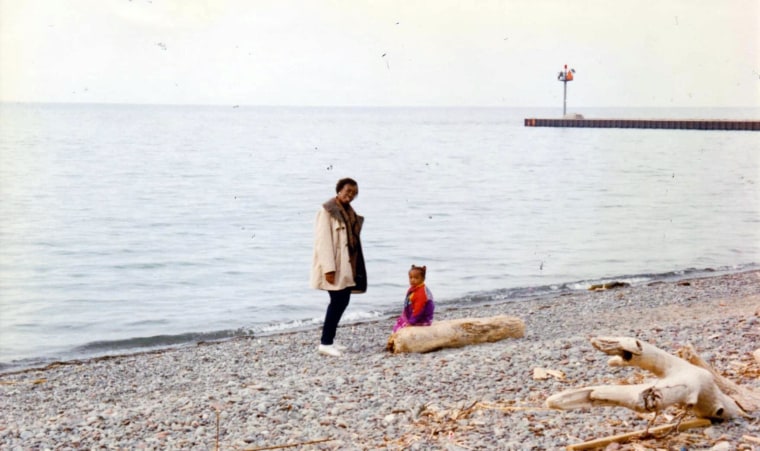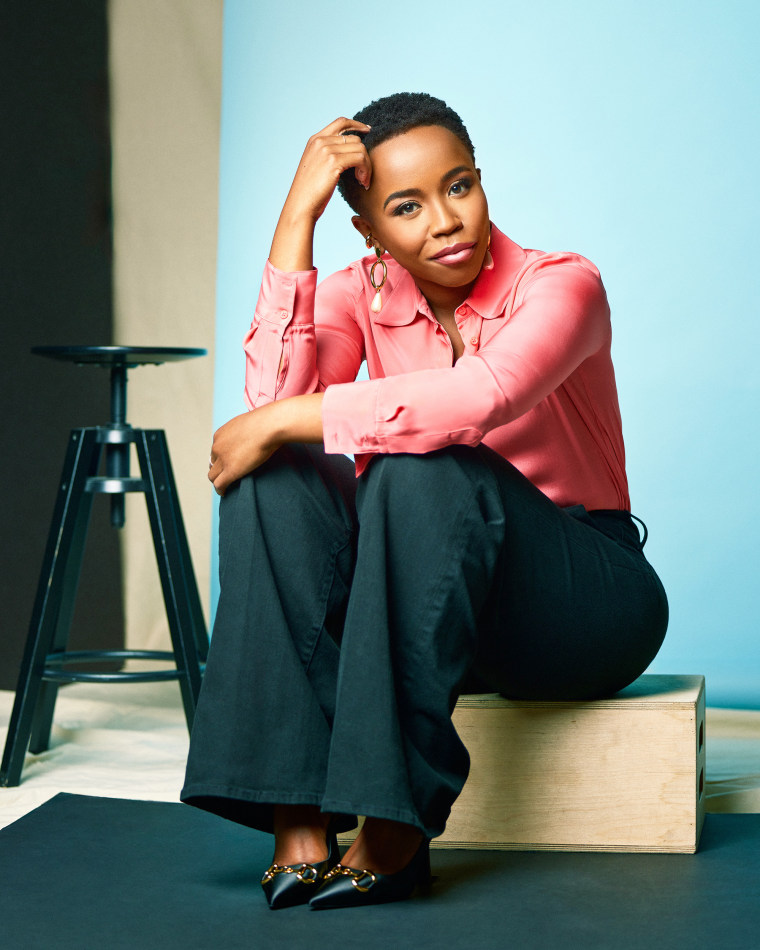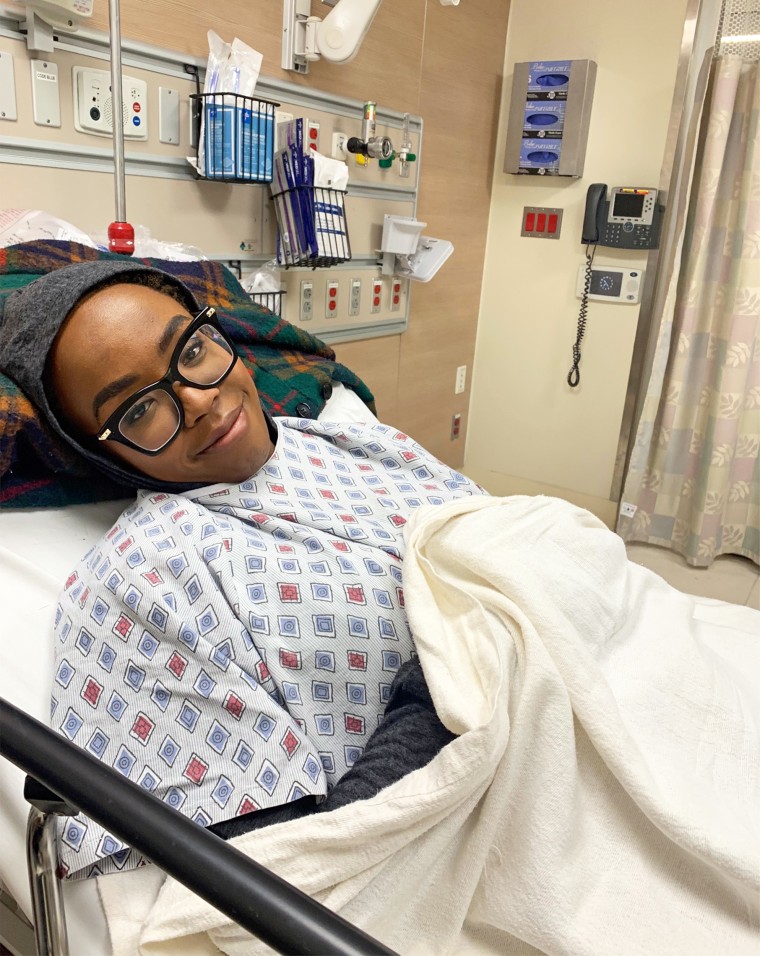My mom was diagnosed with fibroids in her 20s.
Back then, she was an immigrant from Uganda with no money and no insurance. At the time, she didn’t have kids but wanted to have them one day. So, she went to a clinic after feeling a lump in her pelvis, worried it was cancer — and petrified she may never be able to conceive. It turned out to be fibroids.
Fast forward several decades and her daughter (spoiler: me) has great health insurance and reports on social and health disparities around the country — with a heightened focus on Black women’s health.
Yet, I still ended up in the emergency room because of the same condition she had. And I believe it was preventable.

I’ve complained of intensifying period symptoms since my period began at the young age of 9. I remember my mom coming to my elementary school to meet with my teacher, to explain my “situation” and that I would need special bathroom breaks to navigate my new normal. Yes, I was embarrassed.
As I got older, in my adolescence and young adulthood, embarrassment quickly turned to dread. Every month, I would miss school and social events with friends, and pack my purses with a medley of menstrual products — all in the hopes of assuaging my monthly menace. Every few years, my cycle and symptoms would change and worsen, too.
So, three years ago, after repeatedly complaining of heavy bleeding, I got an ultrasound, which revealed fibroids. In some ways, I was relieved.
“Maybe that’s why my periods have been so miserable!?” I thought.
But in many ways, I was still in the dark about my condition. I wasn’t given much medical guidance beyond: “You have fibroids, which is why your periods are heavy.”

According to Johns Hopkins Medicine, up to 77% of women will develop fibroids at some point during their childbearing years — and only about a third of these fibroids are large enough to be detected, so women often go undiagnosed.
Despite various interventions — an IUD, on-and-off acupuncture, an intentional, clean diet and workout regimen — my periods continued to worsen. I raised the issue with my doctor but, after repeated dismissals, I started to question myself: Maybe this was all part of getting older? My cycles continued to be several days longer than average, and my pain intensified.
But I never experienced spotting or irregular bleeding. That is, until two months ago.
I was visiting my grandmother in rural Uganda when I started experiencing an abnormal episode of bleeding. (Talk about a relaxing vacation!)
I had just finished my period, so I should not have been bleeding. I was quite literally miles away from the nearest pad — and I didn’t dare dream of finding a tampon. But I’m a planner and not a panic-er, so from my little hotspot I booked an appointment with my OB-GYN for the morning I returned from my trip.
I arrived at the doctor’s office jet-lagged and still bleeding heavily after a week and a half. I couldn’t see the doctor, but the nurse conducted a physical exam, said she didn’t feel anything and referred me for an ultrasound, which was scheduled for four days later.
I never made it to that appointment. The next day, while anchoring my show, NBC News Daily, I was hit with a bout of fatigue. I assumed it was jet lag, but that evening it only worsened. By the time I got home, I was bleeding so heavily I had to put myself in the bathtub. I was passing clots.
Did I need to go to the emergency room?

Thankfully, I texted that question to my friends, who answered with an immediate YES.
What I hoped would be a short visit in the emergency room quickly became an hours-long process filled with IVs, physical exams, ultrasounds and a smattering of questions. I was admitted at 10 p.m. and discharged hours later, at 3 a.m. The diagnosis I received? One of my fibroid had grown and dislodged my IUD.
In the next few days, as I waited for my first appointment with a fibroid specialist at NYU Langone’s Center for Fibroid Care, I did what any good journalist would do: I researched.
I stumbled upon a TODAY clip of Dr. Taraneh Shirazian. I was instantly surprised, excited and relieved — she was the doctor I had just scheduled an appointment with! The serendipity felt divine.
I was nervous when I got to my appointment with Dr. Shirazian. I learned one of my fibroids had doubled in size; it was as big as my entire uterus. If I didn’t take action, she told me, my symptoms would continue.
I walked into this health crisis knowing I had fibroids and some of the associated risks and potential treatments — but I didn’t know how many new options were available to me. I was pleasantly surprised by how many medicinal and surgical interventions exist for fibroids. I ultimately underwent one of the least invasive surgical procedures, a hysteroscopy, as a first step in treatment.
Today, a portion of my largest fibroid has been removed. It’s only the first step in my road to recovery, but here’s what I’ve learned so far.
Bring friends, don’t go it alone
When all my hospital visits began, I started a “UTERUS UNION” group chat with some friends. They provided the affirmations and accountability I needed. One friend even came to the ER with me and took notes.
Slow down
Don’t be afraid to pause the discussion with your doctor, ask for clarification or to circle back to something.
Trust your gut
No one knows your body better than you. If a doctor is not listening to you or you feel unheard, seek another.
Track your cycle (meticulously)
Yes, it’s laborious, but track your cycle and the number of pads, tampons or cups you use. Knowledge is power and you can use that information to find solutions.
Know what’s normal and what’s not
It wasn’t until I found NYU Langone’s Center for Fibroid Care that I was ever told that bleeding through your clothes or regularly missing life events due to your cycle are abnormal. I wish someone would have told me that sooner, especially amid my years of repeated complaints.
Find moments of levity
An unabashed Beyonce fan, it was only fitting to name my largest fibroid “Cowboy Carter.” Beyonce is breaking genre barriers, and my submucosal fibroid broke layers too! Plus, they dropped in the same month.
I almost didn’t want to share this story. Isn’t talking about my uterus on national TV a turnoff? But through this process, I’ve learned I have nothing to be ashamed of. So much of my suffering was caused by my voice not being heard, or information not being shared. So I’m writing to change that — to speak up and share, in hopes that preventable pain is avoided — and women get the attention, support and advocacy they deserve.









